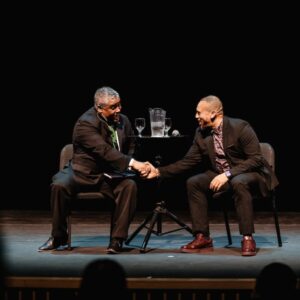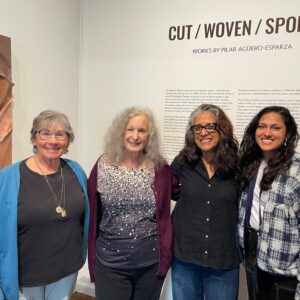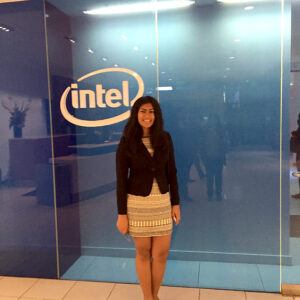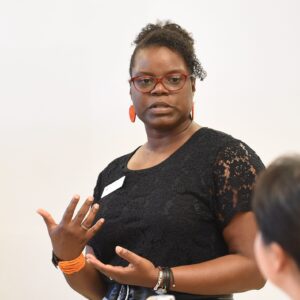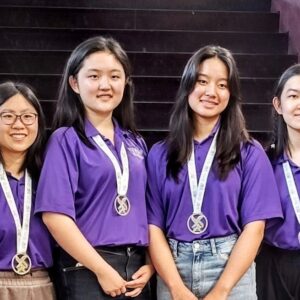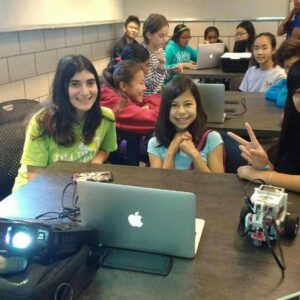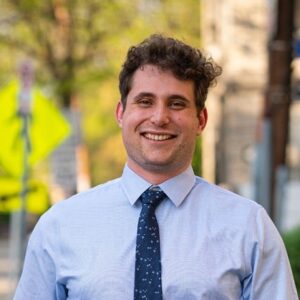This article originally appeared in the winter 2014 Harker Quarterly.
By Mayra Flores De Marcotte
It’s identified as the gender gap and has been a topic of heated discussion in recent years. According to various organizations, statistics and studies, there is a significant gap between males and females entering – and staying in – the computer science fields.
The National Science Foundation found that computer science is the only field in which women are receiving fewer degrees since 2002 – only 18 percent compared with 37 percent 12 years ago.
Even before getting to the college level, only 23 states – including California – and the District of Columbia count computer science as a graduation requirement and those offering AP computer science classes are down 35 percent since 2005, according to the National Center for Women and Information Technology.
These trends are important to note because of the impact computer science will have on the future job market. According to the U.S. Department of Labor, there will be more than 1 million computer specialist job openings by 2020, but our universities will only produce 29 percent of the qualified graduates needed to fill these jobs.
At The Harker School, however, administrators, educators and students are setting their own trend by embracing computer science education and the school is encouraging all its students to explore the field by making it a graduation requirement. Robust class offerings include Digital World, a foundational class that offers insights into computer science history, the digital representation of data and computer architectures. Other classes offered include introductory and advanced programming, data structures, AP Computer Science and 11 courses in advanced topics in computer science, seven of which are UC-approved courses.
According to the Information Technology and Innovation Foundation, only 5 percent of U.S. high schools are certified to teach AP computer science courses and only 10 percent of U.S. K-12 schools offer computer science classes at all.
Harker’s dedication to teaching and inspiring all students equally, regardless of gender, makes for an inviting classroom atmosphere.
“I think Harker is unique because it creates a safe environment where everyone feels like they have the chance to try anything without worrying about factors that could potentially ostracize them such as gender,” said Shivali Minocha, grade 11. “While students at other schools may find it unconventional to take computer science classes, at Harker the class feels just as accessible and welcoming as any other class I’ve taken here.”
Classes spark Curiosity
Minocha took her first robotics class in grade 7 as a part of the curriculum, which exposed her to basic code and the various applications of computer science. Her first programming course, during the Harker Summer Institute, was a prerequisite for the AP Computer Science course she’s currently enrolled in.
“It’s always exciting to have the ability to actually apply the skills I’m learning in class outside of it,” she says. “There are several clubs and programs at Harker that make this possible like the Computing Club, the Programming Club and the Robotics [Club].
“It’s also extremely cool to be able to successfully run a program after working on it for a long time,” Minocha said. “It’s a great feeling when your code finally compiles correctly.”
Earlier this year, Minocha and a team of three other Harker students entered Technovation, an entrepreneurship program and competition for girls, with an app they developed called Aura, aimed at helping teenage girls deal with their emotions in a safe way. The app matches a girl’s mood with images, quotes and music and allows them to share with their friends.
Teammate Sameep Mangat, grade 9, was first introduced to computer science and the world of coding by her father and older brother.
“Even at a young age, I was given the opportunity to contribute to the software and the design,” she said. “This experience overall fostered a curiosity that [grew] through the creation of an app called Aura with my friends. We submitted this app to a competition, and although we didn’t win, it was an amazing experience and helped me learn a lot more about coding and design.”
Investing in Our Brain Trust
Eric Nelson, computer science department chair at Harker, teaches numerous computer science classes. He began his career as an experimental physicist in the defense industry and is well aware of the much-talked about gender gap, but says not engaging girls and women in computer sciences is a disservice to the greater population.
“I am a firm believer in investing in our brain trust, and ignoring half of that potential seems to go way beyond negligent,” he said. “New ideas and inventions require a critical mass. By encouraging women to join in the computer science revolution – and you have to capture their attention early in life – the probability of an earth-shattering discovery or idea is greatly increased, to the benefit of all.”
Nelson witnessed the power of this potential during his career prior to Harker.
“In all my years managing software engineers, one of my absolute best was a young woman in Albuquerque,” Nelson said. “She was methodical, organized and had an amazing attention to detail. Her ability to think algorithmically was also top notch.”
Nelson became the chair of the upper school computer science department in 2010 with a goal of better preparing students through a diverse portfolio of classes that would allow them to better explore multiple opportunities within the computer sciences.
Harker’s location within Silicon Valley also plays a role in its trendsetting. Being in the midst of technological developments, new ideas and even newer challenges helps to organically elicit interest in computer sciences from the student body – and the girls are no different.
Daniela Lee, grade 12, took her first programming class during the summer between her freshman and sophomore years to learn more about computer science. She and classmate Sadhika Malladi, grade 11, were regional finalists in the Google Science Fair competition this year, and received a commendation from the city of San Jose recognizing their effort. The online competition, open to students around the globe, has taken place every year since 2011. Lee and Malladi entered their project, “Non-Invasive Search for Optimal Cancer Treatment.”
“We love people, we’re good at programming and we want to predict cancer,” begins their video.
The basis of the project was to avoid unnecessary surgeries, particularly those related to triple negative breast cancer, through the use of a learning algorithm and a new type of MRI machine to better predict response to treatment.
“Since we live in the Silicon Valley, we see and experience a lot of the newest technological innovations, most which are related in some way to programming,” Lee said. “Moreover, a considerable amount of things in our lives come about due to some code someone programmed.”
Lee found computer science much easier than she first anticipated and an exciting field of study she hopes to continue to explore, particularly within graphic design and medicine.
Malladi caught the computer science bug early, after taking an elective class in middle school where she learned how to create websites using Dreamweaver.
“I was inspired by the potential that the rapidly growing field holds for solving a diverse set of problems that pervade society,” she said, adding that many people have the misconception that computer science is used just for creating programs and applications.
“In reality, almost everything is fueled by computer science,” Malladi said. “It’s at the forefront of revolutionizing everyday life and changing the world around us. Computer science is something that we experience through music, video games and the Internet, but it’s also something that is pioneering new interdisciplinary fields that solve important problems.”
Reading and hearing all about the gender gap never swayed her decision to enroll in a class.
“In a way, Harker’s subtle recognition of the minority position is one of the best ways to approach the issue,” Malladi said. “By not explicitly addressing the underrepresentation of females in computer science, Harker avoids perpetuating the stereotype that discourages so many high school girls. However, Harker still takes steps toward encouraging women into [computer science] careers.”
Providing a diverse list of classes, as well as a deep bench of educators to connect with students, is key to the program’s success. And it was within this deep bench of teachers that one educator made her mark on many of her pupils, particularly the females.
Passing It On
Susan King joined the Harker faculty seven years ago after her family left their home in Florida and moved to the other sunshine state: California. Originally from Montana, King was first introduced to computer science in the sixth grade after her math teacher read a short article about the up-and-coming field of computer science.
“He said it offered equal opportunity for both men and women and you had to be good at math and I said to myself, this was for me,” she said.
King was part of the first group of graduating students to receive a bachelor’s degree in computer science from Montana State University and went on to receive her M.Ed. in educational technology from the University of Central Florida.
She spent the first decade after college as a programmer and loved it. “I just love the puzzles,” King said. “For many years, it was like being in a candy store – sampling all these candies that were puzzles. The other thing that I loved about the profession was the people. There were so many interesting people in this new field.”
She later left programming to start a family and then decided to pursue education as a career.
“I went into teaching and fell in love with it even more than programming,” King said. “I’ve been at Harker now for seven years and it’s a phenomenal place to work. It’s the first school where I wasn’t the only programming teacher and a great opportunity to work with other teachers in the field. I have been fortunate to have two careers that I loved.”
King has worked with countless students – including many girls – who have gone on to participate within the computer sciences through projects, research and professional careers after Harker.
Life After Harker
Rashmi Sharma ’10 majored in bioengineering at Stanford University. She has a minor in computer science and now works at Genentech, in its process development rotational program.
She credits her time at Harker for instilling within her a desire to learn more about computer science.
“I definitely wouldn’t have had the guts to have minored in computer science without the confidence from Harker and Mrs. King,” Sharma said.
She really liked science and math and had already taken biology and chemistry during high school but computer science was the only “techie” class she hadn’t explored. Sharma wanted exposure to it before heading to college, so she signed up for AP Computer Science and immediately felt intimidated by the coursework. This quickly changed once the class began.
“The way Mrs. King approached introducing [it to] us, it all felt less intimidating and less abstract; a less obscure concept than what I thought it would be,” Sharma said. “She started all lectures from the ground level. I never felt disadvantaged. Everyone was on a level playing field.”
It was only after leaving Harker that Sharma realized how different the learning environment actually was.
“Before I went to college, I never felt there was a difference in expectations between girls and boys,” she said. “It wasn’t until college that I saw a difference.”
The disparity in the male-to-female ratio became especially obvious in Sharma’s computer science lectures and, for a moment, made the field feel intimidating once more.
“All these guys had been breathing computer science way longer than I had and [also had] more previous exposure than I had; it made it harder for me to be more comfortable in class,” she said. “But it’s evolving.”
Fellow Harker alumna Katie Siegel ’12 agrees. Siegel is now studying computer science at MIT. She began exploring computer science in a programming class at Harker.
“I intended it to be a one and done but found it fairly easy and I liked the projects we did,” Siegel said. “Mrs. King made it very interesting and explained the concepts in a comprehensive way. We were able to see the relevance of what we were working on and the infinite number of opportunities.”
She was unaware of the gender gap while attending Harker.
“I never felt like there was any sort of [gender] barrier at Harker,” she said. “I never paid attention to the gender ratio. I feel like it was fairly even. I didn’t know there was a gender problem until I got to college.”



